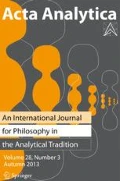Abstract
This paper defendsintensional essentialism: a property (intensional entity) is not essential relative to an individual (extensional entity), but relative to other properties (or intensional entities). Consequently, an individual can have a property only accidentally, but in virtue of having that property the individual has of necessity other properties. Intensional essentialism is opposed to various aspects of the Kripkean notion of metaphysical modality, eg, varying domains, existence as a property of individuals, and its category of properties which are both empirical and essential with respect to particular individuals and natural kinds. The key notion of intensional essentialism isrequisite. A requisite is explicated as a relation-in-extension between two intensions (functions from possible worlds and moments of time)X, Y such that wherever and wheneverX is instantiatedY is also instantiated. We predict three readings of the sentence. “Every wooden table is necessarily wooden”, one involving modalityde re and the other two modalityde dicto. The first reading claims that no individual which is a wooden table is necessarily wooden. The claim is backed up by bare particular anti-essentialism. The two other interpretations claim that it is necessary that whatever is a wooden table is wooden. However, as we try to show, one is logically far more perspicuous thanks to the concept of requisite and thus preferable to more standardde dicto formalizations.
Similar content being viewed by others
References
Cocchiarella, Nino B. (1986) ‘Philosophical Perspectives on Quantification in Tense and Modal Logic’, in: Gabbay and Guenthner (1984), Vol. II, Ch. II.6, pp. 309–53.
Dretske, Fred. I (1977) ‘Laws of Nature’Philosophy of Science, Vol. 44, pp. 248–68.
Forbes, Graeme. (1985)The Metaphysics of Modality (Oxford: Clarendon Press).
Gabbay, Dov and Guenthner, Franz (eds) (1984),Handbook of Philosophical Logic, Vol. I–IV, Dordrecht: D. Reidel.
Hanson, Norwood Russell (1967) ‘Imagining the Impossible’Analysis, Vol. 19, pp. 86–92.
Kripke, Saul. (1980)Naming and Necessity (Oxford: Blackwell).
Lewis, David (1986)On the Plurality of Worlds (Oxford: Blackwell).
Lindström, Sten. (2001). ‘Quine’s Interpretation Problem and the Early Development of Possible Worlds Semantics’, in: Ondrej Majer (ed.),The Logica Yearbook 2000, Prague: Czech Acacemy of Sciences, Filosofia, pp. 29–56.
Marcus, Ruth Barcan. (1971) ‘Essential Attribution’,The Journal of Philosophy, Vol. 68, No. 7, pp. 187–202. Reprinted as Ch. 4 of Marcus (1993).
Marcus, Ruth Barcan (1990). ‘A Backward Look at Quine’s Animadversions on Modalities’, inPerspectives on Quine, ed. R. Barrett and R. Gibson (Oxford and Cambridge, Mass.: Blackwell), pp. 230–43. Reprinted as Ch. 14 of Marcus (1993).
Marcus, Ruth Barcan. (1993)Modalities (New York, Oxford: Oxford University Press.)
Materna, Pavel. (1998)Concepts and Objects. Acta Philosophica Fennica, Vol. 63, Vantaa: Tummavuoren Kirjapaino oy.
Mitchell, Sandra D. (2000) ‘Dimensions of Scientific Law’Philosophy of Science, Vol. 67, pp. 242–65.
Priest, Graham. (1992) ‘What is a Non-Normal World?’Logique et Analyse 139–40, pp. 291–302.
Roy, Tony (2000) ‘Things andDe Re Modality’,Noûs, Vol. 34, No. 1, pp. 56–84.
Stalnaker, Robert. (1979) ‘Anti-Essentialism’,Midwest Studies in Philosophy. Vol. 4, pp. 343–355.
Tichý, Pavel. (1975) ‘What Do We Talk About?’Philosophy of Science, Vol. 42, pp. 80–93.
Tichý, Pavel. (1979) ‘Existence and God’The Journal of Philosophy, Vol. 76, pp. 403–20.
Tichý, Pavel. (1983) ‘Kripke on Necessitya posteriori’Philosophical Studies, Vol. 43, pp. 225–41.
Tichý, Pavel. (1987) ‘Einzeldinge als Amtsinhaber’Zeitschrift für Semiotik, Vol. 9, pp. 13–50.
Tichý, Pavel. (1988)The Foundations of Frege’s Logic (New York and Berlin: de Gruyter).
Author information
Authors and Affiliations
Rights and permissions
About this article
Cite this article
Jespersen, B., Materna, P. Are wooden tables necessarily wooden?. Acta Analytica 17, 115 (2002). https://doi.org/10.1007/BF03177511
DOI: https://doi.org/10.1007/BF03177511


